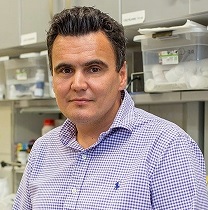Department of Chemical Biology and Bioimaging at Wroclaw University of Science and Technology is headed by prof. Marcin Drąg, and formed by four research groups of: prof. Marcin Drąg, prof. Stanisław Lochyński, Dr. Paulina Kasperkiewicz and Dr. Marcin Poręba.
 The main research focus of the prof. Marcin Drąg group is the investigation of proteases specificity in context of the development of new substrates, inhibitors and activity-based probes. For this purpose prof. Drąg developed a chemical approach called HyCoSuL (Hybrid Combinatorial Substrate Library), which utilizes a wide range of unnatural amino acids, enabling for in-depth exploration of proteases active site architecture. This technology has been already used for dissecting the catalytic preferences of almost hundred proteases of various origin, which yielded multiple chemical tools useful for various chemical biology research. Among the most prominent examples are serine neutrophil proteases, cysteine cathepsins, apoptotic caspases, and human proteasome. Currently the major interest of prof. Drag group is to develop selective chemical tools for the labeling of deubiquitinating enzymes and viral proteases with particular interest in SARS-CoV-2.
The main research focus of the prof. Marcin Drąg group is the investigation of proteases specificity in context of the development of new substrates, inhibitors and activity-based probes. For this purpose prof. Drąg developed a chemical approach called HyCoSuL (Hybrid Combinatorial Substrate Library), which utilizes a wide range of unnatural amino acids, enabling for in-depth exploration of proteases active site architecture. This technology has been already used for dissecting the catalytic preferences of almost hundred proteases of various origin, which yielded multiple chemical tools useful for various chemical biology research. Among the most prominent examples are serine neutrophil proteases, cysteine cathepsins, apoptotic caspases, and human proteasome. Currently the major interest of prof. Drag group is to develop selective chemical tools for the labeling of deubiquitinating enzymes and viral proteases with particular interest in SARS-CoV-2.
 The research within prof. Stanisław Lochyński and Dr. Daniel Strub group is themed at the intersection of organic, analytical, and biological chemistry, as well as chemical technology. This group carries (1) fundamental (combinatorial approaches to establish SORs (Structure-Odor Relationships) of new synthetic odorants; determination of key odorants of valuable fragrant raw materials; biotransformations of natural products), (2) applied (construction and the use of flow reactors for the synthesis of optically pure low-molecular compounds; evaluation of biocidal properties of new fragrances and their environmental impact), and (3) industrial (scale-up, preparation for the implementation to the market) studies in the general area of natural products and fragrance chemistry.
The research within prof. Stanisław Lochyński and Dr. Daniel Strub group is themed at the intersection of organic, analytical, and biological chemistry, as well as chemical technology. This group carries (1) fundamental (combinatorial approaches to establish SORs (Structure-Odor Relationships) of new synthetic odorants; determination of key odorants of valuable fragrant raw materials; biotransformations of natural products), (2) applied (construction and the use of flow reactors for the synthesis of optically pure low-molecular compounds; evaluation of biocidal properties of new fragrances and their environmental impact), and (3) industrial (scale-up, preparation for the implementation to the market) studies in the general area of natural products and fragrance chemistry.
 Dr. Paulina Kasperkiewicz lab focuses on the development of fluorescent chemical probes for the dissecting the role of human neutrophil serine proteases (NSPs) in health and disease. The primary goal is to understand how neutrophil serine proteases are distributed within neutrophil cells, and how NSPs localization and catalytic activity orchestrate neutrophils functions and their demise. For this purpose, Dr. Kasperkiewicz utilizes confocal fluorescence microscopy and quenched activity-based probes (qABPs). Currently, Dr. Kasperkiewicz team is aiming to decipher the role of NSPs activity in the development of neutropenia, a disease manifested by abnormally low concentration of neutrophils in blood.
Dr. Paulina Kasperkiewicz lab focuses on the development of fluorescent chemical probes for the dissecting the role of human neutrophil serine proteases (NSPs) in health and disease. The primary goal is to understand how neutrophil serine proteases are distributed within neutrophil cells, and how NSPs localization and catalytic activity orchestrate neutrophils functions and their demise. For this purpose, Dr. Kasperkiewicz utilizes confocal fluorescence microscopy and quenched activity-based probes (qABPs). Currently, Dr. Kasperkiewicz team is aiming to decipher the role of NSPs activity in the development of neutropenia, a disease manifested by abnormally low concentration of neutrophils in blood.
 The research within Dr. Marcin Poreba group focuses on the development of enzymes selective activity-based probes which are compatible with mass cytometry technology (so called: TOF-probes). For this purpose enzymes probes are labeled with stable isotopes of lanthanide metals enabling for the simultaneously detection of over 40 enzymes within one sample. The application of TOF-probes in mass cytometry settings enables for in-depth profiling of an activome, which is a set of catalytically active proteins (functional proteome). Currently, Dr. Poreba lab is investigating the activome within two cancer diseases: breast cancer and leukemia. The secondary focus of Dr. Poreba lab is the development of protease-selective anticancer prodrugs.
The research within Dr. Marcin Poreba group focuses on the development of enzymes selective activity-based probes which are compatible with mass cytometry technology (so called: TOF-probes). For this purpose enzymes probes are labeled with stable isotopes of lanthanide metals enabling for the simultaneously detection of over 40 enzymes within one sample. The application of TOF-probes in mass cytometry settings enables for in-depth profiling of an activome, which is a set of catalytically active proteins (functional proteome). Currently, Dr. Poreba lab is investigating the activome within two cancer diseases: breast cancer and leukemia. The secondary focus of Dr. Poreba lab is the development of protease-selective anticancer prodrugs.